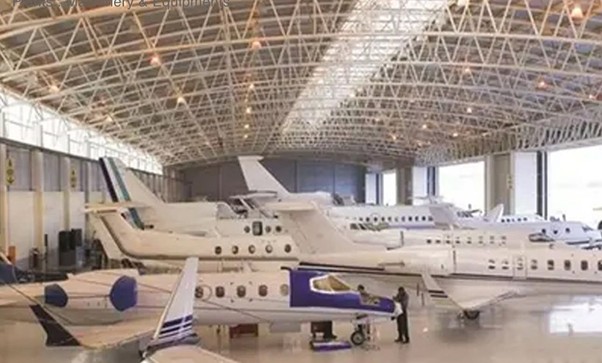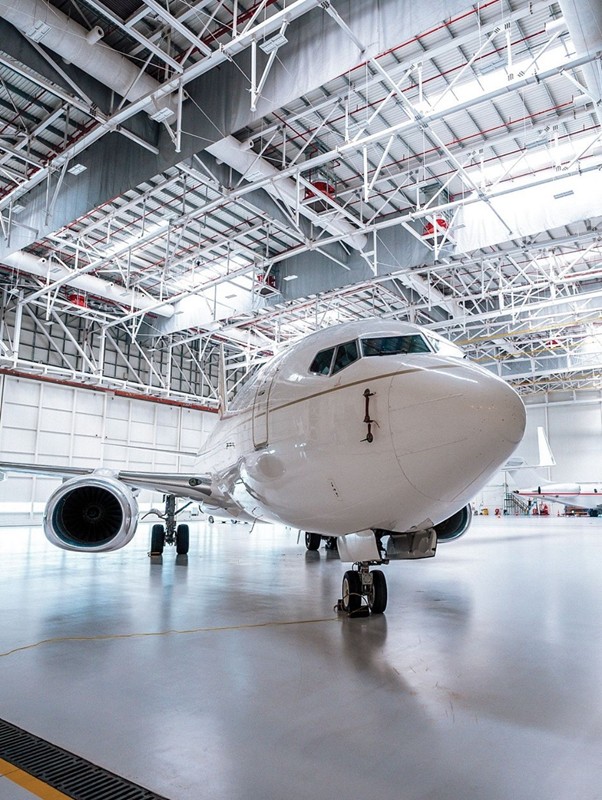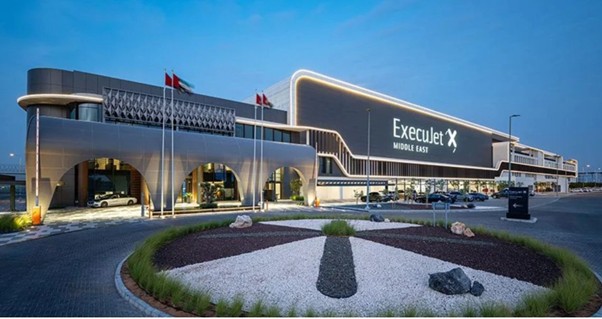The Future of FBOs Lies in Technology
In the aviation world, luxury and comfort often steal the headlines. We marvel at private lounges that feel like palaces, at spa services within terminals, or at ultra-fast immigration procedures. Yet, behind every smooth experience at a world-class Fixed Base Operator (FBO), there is a technological backbone that makes it possible.
This is the lesson Indonesia can learn from ExecuJet Dubai, one of the Middle East’s premier FBOs. Beyond marble floors and gold-plated hospitality, what truly sets ExecuJet apart is its integration of advanced technology into business processes, people management, and operational frameworks.
Indonesia, with its growing aspirations to modernize aviation infrastructure, has an opportunity to adapt and even innovate upon these lessons.

ExecuJet Dubai: More Than Just a Terminal
ExecuJet’s facilities at Dubai International and Al Maktoum International Airports are not simply transit points for the ultra-rich; they are digitally powered ecosystems.
- Concierge & Passenger Management Systems: Every passenger’s preference, from dietary restrictions to ground transport, is logged in a digital system accessible to all relevant staff.
- Turnaround Tracking Technology: Aircraft maintenance, fuelling, and cleaning are monitored through real-time dashboards to ensure the industry-leading 30-minute turnaround.
- Biometric Security: Immigration and customs are integrated with biometric verification, ensuring both speed and security.
- Integrated Crew Apps: Pilots and crew use dedicated apps to coordinate schedules, access accommodation options, and request ground services.
- Predictive Maintenance Systems: Aircraft servicing and hangar operations use predictive analytics to anticipate issues before they arise, reducing downtime.
- Smart Facilities Management: Energy-efficient systems, digital climate control, and IoT-enabled surveillance ensure that the FBO operates sustainably while maintaining comfort.
This fusion of aviation precision + digital innovation + luxury service explains why ExecuJet is more than just a passenger experience; it is an operational benchmark.

The Business Process (Bispro) Reinvented by Technology
ExecuJet has redefined the traditional business process (bispro) of FBOs by embedding technology into every stage:
- Pre-Arrival Coordination: Digital platforms link aircraft operators with ground staff, ensuring catering, visas, fuelling, and slot approvals are ready before touchdown. AI-driven scheduling predicts peak times, preventing bottlenecks.
- Arrival Operations: Passengers are fast-tracked using biometric scanners. Baggage and fuelling are coordinated in real time via handheld devices.
- Passenger Experience: A digital concierge system personalizes services, from limousine bookings to spa preferences. Touchscreen tablets in lounges allow passengers to adjust lighting, order food, or request staff assistance instantly.
- Aircraft Turnaround: Digital “Gantt charts” monitor the fuelling, cleaning, and maintenance timeline to ensure efficiency.
- IoT-enabled ground support equipment provides status updates directly to the ops centre.
- Post-Departure Review: Every service step is logged in a digital CRM system, producing data analytics for continuous improvement. Customer satisfaction surveys are instant and accessible via apps.
In short, ExecuJet’s bispro is not only about efficiency but also about data-driven excellence.
PPF I: People, Procedures, Facilities Enhanced by Tech
When seen through the first PPF lens (People, Procedures, Facilities), ExecuJet’s reliance on technology becomes even clearer:
- People: Staff use multilingual translation apps and wearable communication devices to serve international clientele seamlessly. Training modules are delivered through e-learning platforms, ensuring consistent standards.
- Procedures: SOPs are digitized and embedded into daily workflows. Real-time monitoring tools flag any deviation from safety or service standards, ensuring compliance without delays.
- Facilities: Lounges are equipped with smart lighting, automated climate control, and high-speed digital connectivity. Hangars use IoT sensors to monitor environmental conditions for aircraft preservation.
PPF II: Policies, Practices, Frameworks in the Digital Age
ExecuJet also excels in Policies, Practices, and Frameworks (PPF) by embedding global compliance into digital systems:
- Policies: Compliance with ICAO, IATA, and IS-BAH standards is monitored through digital audit trails. Cybersecurity policies protect sensitive passenger data.
- Practices: Routine practices such as sub-30-minute turnarounds or biometric CIQ clearance are standardized through digital workflows rather than manual coordination.
- Frameworks: Strong partnerships with government agencies are enhanced by digital integration. For example, immigration officers can access ExecuJet’s systems for pre-clearance, reducing human error.

Indonesia: A Nation at the Crossroads
Indonesia’s current FBO landscape—at Soekarno-Hatta, Halim, Bali, and Balikpapan—remains largely analog. Passenger clearance is manual, lounges lack digital personalization, and turnaround coordination relies on radio communication rather than integrated platforms.
The gaps are stark:
- Fragmented Procedures: Manual CIQ processes delay passengers.
- Outdated Facilities: Lounges resemble upgraded waiting rooms, not smart lifestyle hubs.
- Human Resource Constraints: Staff lack training in both luxury service and digital tools.
- Weak Digital Infrastructure: Limited adoption of AI, IoT, or predictive analytics in aviation support.
Yet, Indonesia has unique strengths: a booming tourism sector, strategic air corridors, and a growing class of private jet owners. The missing link is technology integration.
What Indonesia Can Learn from ExecuJet
By drawing lessons from ExecuJet, Indonesia can chart a new path:
- Digital CIQ Hubs: Embed immigration and customs into FBO lounges using biometric scanners and e-gates. This reduces wait times and enhances privacy.
- Real-Time Turnaround Systems: Deploy integrated dashboards for ground handling, fuelling, and maintenance. A sub-30-minute benchmark is realistic with proper tech adoption.
- Smart Lounges: Equip lounges with IoT-enabled comfort controls, high-speed connectivity, and digital concierge apps tailored to Indonesian culture.
- Predictive Maintenance & Green Ops: Adopt predictive analytics for hangar management and use IoT to improve energy efficiency. This aligns with Indonesia’s sustainability goals.
- Training Through Tech: Build e-learning platforms for FBO staff, combining aviation safety with hospitality and digital tool usage.
- Tourism Integration: Use digital concierge platforms to link FBOs with luxury resorts, yachts, or eco-tourism sites. For example, a Bali FBO could automatically sync with Nusa Dua resorts.
Safety, Security, and Compliance in a Digital Context
ExecuJet proves that technology is not just about convenience—it is about safety and trust. For Indonesia, adopting digital frameworks would mean:
- ICAO-aligned safety management systems powered by predictive data.
- Encrypted passenger data to protect high-profile travellers.
- Automated compliance logs that satisfy regulators and investors alike.
Without these, luxury services risk becoming superficial facades vulnerable to inefficiency or even reputational damage.
The Vision: Indonesia as a Smart Aviation Hub
Picture this:
In Jakarta, a Gulfstream lands at Halim. Within minutes, passengers’ clear biometric immigration, attend a boardroom meeting equipped with holographic conferencing, and depart within an hour.
In Bali, a royal family arrives. A digital concierge syncs their FBO lounge preferences with their villa arrangements, ensuring spa therapists and chefs are ready at their destination.
In Labuan Bajo, eco-luxury travellers land in an FBO designed with green technology, seamlessly connecting them to yachts and diving expeditions.
This is not futuristic fiction—it is the standard Indonesia must aspire to if it wants to compete with Dubai, Singapore, and Hong Kong.
Conclusion: From Analogue to Digital Prestige
ExecuJet Dubai shows us that luxury in aviation is not just about marble floors and VIP lounges—it is about technology-driven efficiency, safety, and personalization.
For Indonesia, the path forward is clear: integrate business processes with advanced digital tools, invest in PPF (People, Procedures, Facilities) enhanced by training and IoT, and embed PPF (Policies, Practices, Frameworks) into digital compliance systems.
By doing so, Indonesia can leapfrog from being a catch-up player to becoming a regional leader in business aviation. Beyond fuel and runways, the future of Indonesian FBOs lies in becoming smart, safe, and seamless lifestyle hubs for the world’s elite.

